

DCMS A BBC for the future linked 1. BBC White Paper: Industry reaction. The BBC is still in danger after the white paper. Culture secretary John Whittingdale told the House of Commons that “the BBC is and must always remain at the very heart of British life” (Report, 13 May).
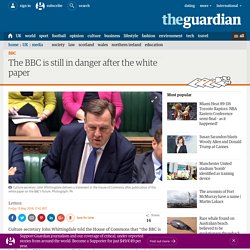
But the white paper tells a different story. It allows the BBC to contract out all of its production, except news, thereby losing most of the staff, skills and expertise that has underpinned its success. Ofcom, an organisation designed to promote commercial communications, will now oversee the relationship between the BBC and the market. As such it is likely to be far more receptive to the pressures from the commercial sector for the BBC to curtail its activities. The BBC must now consider whether subscription “could provide a more sustainable funding model in the longer term”.
Actor Richard Wilson on Whittingdale and BBC White Paper. Fifth Amendment - Constitutional Amendments: From Freedom of Speech to Flag Burning. No person shall be held to answer for a capital, or otherwise infamous crime, unless on a presentment or indictment of a Grand Jury, except in cases arising in the land or naval forces, or in the Militia, when in actual service in time of War or public danger; nor shall any person be subject for the same offence to be twice put in jeopardy of life or limb; nor shall be compelled in any criminal case to be a witness against himself, nor be deprived of life, liberty, or property, without due process of law; nor shall private property be taken for public use, without just compensation.
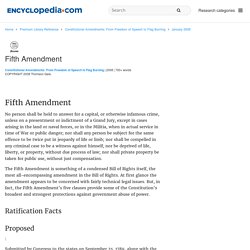
The Fifth Amendment is something of a condensed Bill of Rights itself, the most all-encompassing amendment in the Bill of Rights. At first glance the amendment appears to be concerned with fairly technical legal issues. But, in fact, the Fifth Amendment’s five clauses provide some of the Constitution’s broadest and strongest protections against government abuse of power. Ratification Facts Proposed. 11 Biggest Pros and Cons of Censorship. Censorship is a topic that is spreading like wildfire in our society today.
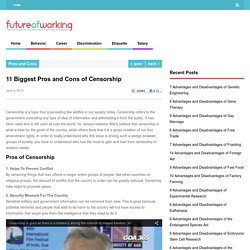
Censorship refers to the government controlling any type of idea of information and withholding it from the public. It has been used and is still used all over the world, for various reasons. Many believe that censorship is what is best for the good of the country, while others think that it is a gross violation of our first amendment rights. 11 Pivotal Pros and Cons of Media Censorship. The limits that have been placed in this world, as far as are placed boundaries that have always been in place on the world, as far as media, communication and entertainment are concerned, are slowly lifting away.
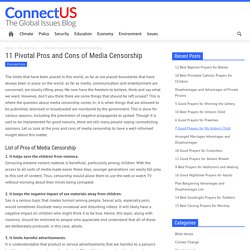
We now have the freedom to believe, think and say what we want. However, don’t you think there are some things that should be left unsaid? This is where the question about media censorship comes in; it is when things that are allowed to be published, televised or broadcasted are monitored by the government. This is done for various reasons, including the prevention of negative propaganda to spread. Though it is said to be implemented for good reasons, there are still many people saying contradicting opinions. Arab Mass Media: Newspapers, Radio, and Television in Arab Politics - William... Since September 11, 2001, and the wars in Afghanistan and Iraq, many television viewers in the United States have become familiar with Al Jazeera as offering an alternative take on events from that presented by mainstream U.S. media, as well as disseminating anti-American invective.
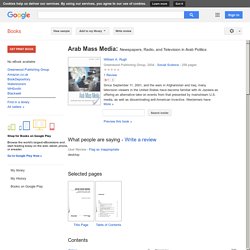
We Don't Need Censorship to Protect Children. The United Nation’s Internet Governance Forum took place in Baku, Azerbaijan November 6-9 I spent last week in Baku, Azerbaijan, where I spoke at the Internet Governance Forum, a United Nations conference for representatives of governments, industry and nonprofit groups to discuss Internet policy issues.
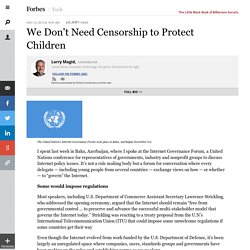
It’s not a rule making body but a forum for conversation where every delegate — including young people from several countries — exchange views on how — or whether — to “govern” the Internet. Extract Quote from Huffpost Media on Censorship. Top 10 Countries That Censor The Internet. Politics.
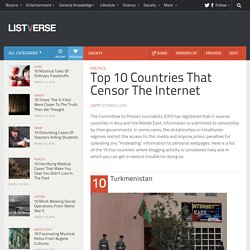
25 Shocking Facts About Chinese Censorship. By Britney Wilkins What would your world be like if you couldn’t log on to Facebook or your favorite celebrity or news websites?
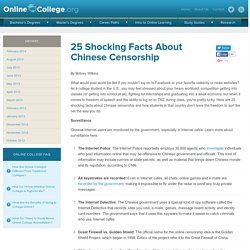
As a college student in the U.S., you may feel stressed about your heavy workload, competition getting into classes (or getting into school at all), fighting for internships and graduating into a weak economy, but when it comes to freedom of speech and the ability to log on to TMZ during class, you’re pretty lucky. Here are 25 shocking facts about Chinese censorship and how students in that country don’t have the freedom to surf the net the way you do. Surveillance Chinese Internet users are monitored by the government, especially in Internet cafes. The Internet Police: The Internet Police reportedly employs 30,000 agents who investigate individuals who post information online that may be offensive to Chinese government and officials.
Jurisdiction and Punishment Restrictions and Blocked Sites Learn about blocked sites, taboo topics and more. 10 Most Censored Countries. The 2015 list of 10 Most Censored Countries is part of CPJ's annual publication, Attacks on the Press.
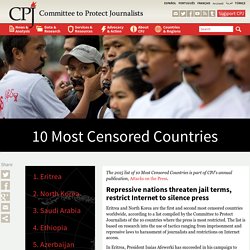
Eritrea and North Korea are the first and second most censored countries worldwide, according to a list compiled by the Committee to Protect Journalists of the 10 countries where the press is most restricted. The list is based on research into the use of tactics ranging from imprisonment and repressive laws to harassment of journalists and restrictions on Internet access. In Eritrea, President Isaias Afewerki has succeeded in his campaign to crush independent journalism, creating a media climate so oppressive that even reporters for state-run news outlets live in constant fear of arrest. The threat of imprisonment has led many journalists to choose exile rather than risk arrest. Eritrea is Africa's worst jailer of journalists, with at least 23 behind bars-none of whom has been tried in court or even charged with a crime. Taboo definition. Censorship Makes No Sense!
10 Orwellian Technologies That Exist Today. Technology Although George Orwell was a little premature in predicting a total surveillance state in 1984, based on some of today’s technology, he wasn’t too far off the mark.

In earlier lists we’ve mentioned a few paranoia-inducing inventions, such as Google Glass, facial recognition software, and brain scanners. If those things didn’t motivate you to don a tinfoil hat, here are 10 more scientific developments to give you the heebie-jeebies. With tools capable of tracking our every movement, reading our minds, and meddling with our brains, Big Brother now has power that Orwell’s Thought Police only dreamed of. Nineteen Eighty-four, by George Orwell. George-Orwell-1984-Audio-book : : Free Download & Streaming : Internet Archive. 13 quotes from George Orwell's 1984 that resonate more than ever. 1984 George Orwell Movie Trailer (1984)
George Orwell, human resources and the English language. In our age there is no such thing as ‘keeping out of human resources’. All issues are human resource issues, and human resources itself is a mass of lies, evasions, folly, hatred and schizophrenia. Haunting Illustrations for Orwell’s Nineteen Eighty-Four, Introduced by the Courageous Journalist Who Broke the Edward Snowden Story. Few things in creative culture are more enchanting than an artist’s interpretation of a beloved book. What are the advantages and disadvantages of Censorship. - A-Level Sociology - Marked by Teachers.com.
Extracts from this document... Introduction The censorship debate is a long one, and the numbers seem to be equally divided between both sides. The internet and pornography: Prime Minister calls for action - Speeches. Media Censorship: Good or Bad? -TargetGD/PI -Group Discussions, Personal Interviews. Businessinsider. Banned Books Online. Presents. Censorship Is Not All Bad.